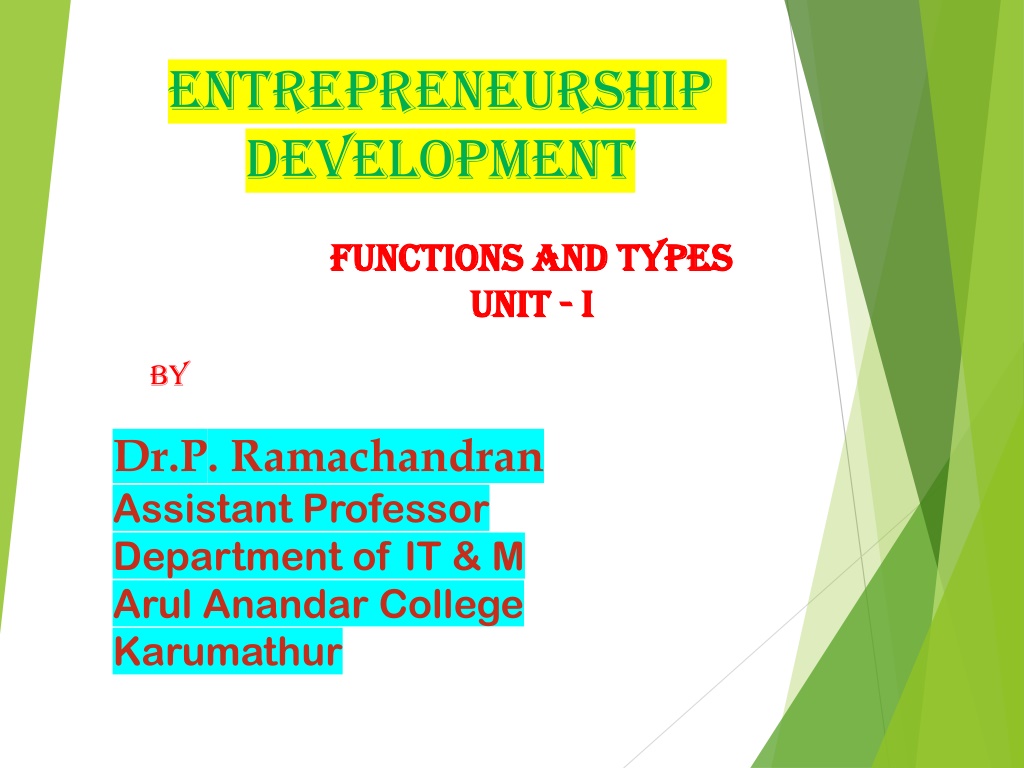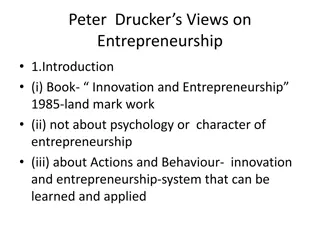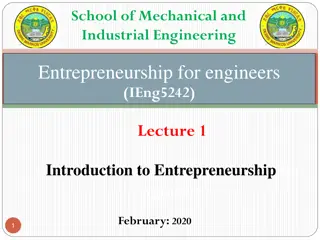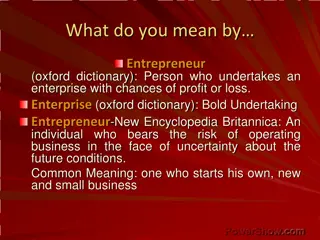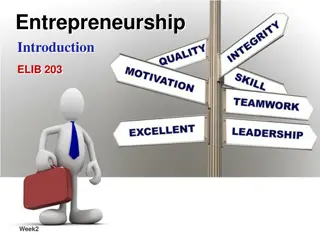The Functions and Types of Entrepreneurship Development
Entrepreneurship involves bringing about changes through innovation and taking risks to pursue new opportunities. It requires characteristics like adaptability, courage, determination, and creativity. The functions of an entrepreneur include market research, idea generation, business analysis, setting objectives, raising capital, and managing resources efficiently.
Download Presentation

Please find below an Image/Link to download the presentation.
The content on the website is provided AS IS for your information and personal use only. It may not be sold, licensed, or shared on other websites without obtaining consent from the author.If you encounter any issues during the download, it is possible that the publisher has removed the file from their server.
You are allowed to download the files provided on this website for personal or commercial use, subject to the condition that they are used lawfully. All files are the property of their respective owners.
The content on the website is provided AS IS for your information and personal use only. It may not be sold, licensed, or shared on other websites without obtaining consent from the author.
E N D
Presentation Transcript
Entrepreneurship development Functions and Types Functions and Types UNIT UNIT - - I I By Dr.P. Ramachandran Assistant Professor Department of IT & M Arul Anandar College Karumathur
Entrepreneur Meaning An entrepreneur is a person who brings overall changes through innovation. Entrepreneur is a change agent.
Entrepreneur High risk taker Hard worker Innovator Honest person Independent Power to dominate Proactive Good managerial capabilities
Evolution of the concept of Entrepreneur The word entrepreneur is derived from the French word enterprendre it means toundertake and literally translated means between-taker or go-between . Entrepreneur is an individual who takes risk and starts something new. Entrepreneur is an innovative person who maximizes his profits by following new strategies or venturing into new products or services.
CHARECTERISTICS OF ENTREPRENEUR
CHARECTERISTICS/QUALITIES OF ENTREPRENEUR Involvement Pride Adaptability Values Foresight Conviction Dynamism Courage High energy level Dreamer Determination Commitment Sound knowledge Technical knowledge Self confidence Passion Flexibility Assertiveness Independent Creativity Human relations Hard working Speed Self reliance Communicator Motivator Initiative Discipline Will power Optimistic Strategist
Functions of Entrepreneur Market research Idea generation Product/service analysis Form of business Determination of business objectives Promotional formality Raising capital Motivating people Providing infrastructure Selection of human resources Carrying out the operations Risk bearing Organization of the resources Innovation
Types of Entrepreneurs Imitative or Adoptive Entrepreneurs. Innovative Entrepreneurs.
CLASSIFICATION OF ENTREPRENEURS Fabian Entrepreneurs. Drone Entrepreneurs.
Types of Entrepreneurs Innovating Entrepreneurs - the one who introduces new goods and new method of production, discovers new market. Imitative Entrepreneurs the one who imitate techniques and technology innovated by others. Fabian Entrepreneurs they imitate only when it becomes perfectly clear. Drone Entrepreneurs They wont do any changes at anytime.
Entrepreneurial Process Identification & Evaluation of opportunity Drawing up of a business plan Determination of the required resources Creating the venture Managing the enterprise
Elements of Successful Entrepreneur Customer- Oriented Market Analysis Management of Finance Systematic Management Successful Entrepreneurship Object-Oriented advice from outside Entrepreneur s Ability
Concept of Entrepreneurship Risk Bearer Organizer Innovator
Growth of Entrepreneurship in India The Past scenario The Current scenario The Future
Past Scenario The past will cover the pre-independence era and the post- independence period. In the period of Rig Veda, the metal handicrafts had Existed. Long before Indian society was divided into four main castes such as Shudras services, Vaishya business, Kshatriya protection, Brahmin knowledge. First, on the banks of the river cities flourished. Then entrepreneurship developed in the north India such as Benaras, Allahabad, Puri and Mirzapur. In later years , India lost both domestic and International markets because people started preferring imported items, because the Indian craftsmen did not change their style and design.
The Current Scenario At present, due to technological advancement, the business environment has changed. Some individuals saw an opportunity in the emerging IT industry. We now see Narayan Murthy, Azim Premji, Raju, Shiv nadar etc., dominating the scene. These entrepreneurs have not only contributed to the economic growth of India but also of the developed countries.
The Future If we make a comparative study of the growth of agriculture, manufacturing and service sectors, we see a high growth in the services sector. This sector will further grow in future. In information technology, bio-technology has the future. In the past, only a few entrepreneurs have made it to the international scene, but in future this number may grow.
Service sector and Small units create employment
ROLE OF ENTREPRENEURSHIP IN ECONOMIC DEVELOPMENT
ROLE OF ENTREPRENEURSHIP IN ECONOMIC DEVELOPMENT National production It promotes balanced regional development It helps reduce the concentration of economic power It encourages effective resource mobilization of capital. It provides immediate large scale employment. It helps to reduce the unemployment problem in the country, the root of all social economic problems. It also promotes country export trade. It is the important ingredient to economic development.
ROLE OF ENTREPRENEURSHIP IN ECONOMIC DEVELOPMENT It stimulates equitable redistribution of wealth, income, and political power in the interest of the country. It introduces new commodities in the market, new sources of raw material for the production. It produces wide variety of consumer and industrial goods
DRIVING FORCES BEHIND ENTREPRENEURSHIP
Classification According to Type of Business Business Entrepreneur. Trading Entrepreneur. Industrial Entrepreneur. Corporate Entrepreneur. Agricultural Entrepreneur. Retail Entrepreneur. Service Entrepreneur. Social Entrepreneur.
INTRAPRENEURS Talented persons from corporate world leave their jobs to start their own business units because they are unhappy with the management
